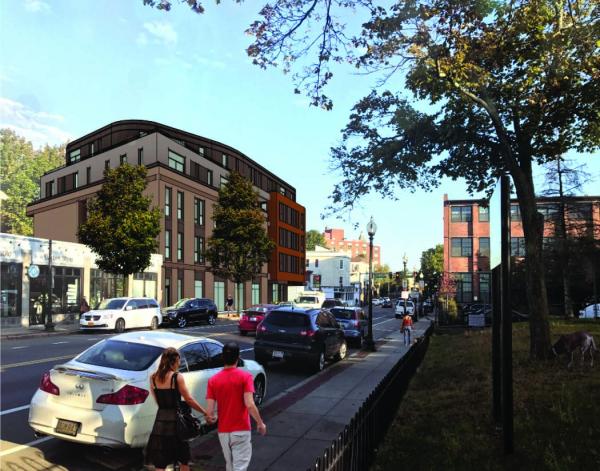March 29, 2018

A rendering shows the proposed new building at 959 Dorchester Avenue , left, that would replace what are now two buildings that house the Tom English pub and Dorchester Market.
The Boston Planning and Development Agency (BPDA) held another community meeting last Thursday to update residents about the progress of the proposed mixed-use development at the current site of Tom English’s bar and Dorchester Market on Dorchester Ave.
There were no significant changes made to the proposal since the last community meeting on Jan. 20. But for those who missed that meeting, last week’s gathering at Saint Teresa of Calcutta church was an opportunity to get familiar with some of the changes that have been made to the proposal since its first inception last year.
“It’s development without displacement, which we’re very proud of,” said Joseph Hanley, the attorney representing developer Adam Sarbaugh, in noting the team’s efforts to incorporate the existing Dorchester Market into new space on the first floor of the proposed building. “We think we can be part of a new discussion about how development happens on Dorchester Avenue at the gateway to the neighborhood.”
The changes since the original design include reducing the building’s height from six stories to five and increasing the number of off-street parking spaces from 22 to 26. The team held four meetings with the Columbia-Savin Hill Civic Association on the project from June to November last year and submitted the required small project application to the BPDA this February.
Many at the meeting of approximately two dozen people also offered their positive responses to the planned project.
“Having lived in Southie, this is a breath of fresh air,” said one nearby resident, speaking about the community planning process. “Over there, it seemed like buildings just went up overnight.”
“I’m totally supportive of this,” said Mark Culliton, CEO of College Bound Dorchester, which runs a program at the Little House site abutting the parcel. “You’ve been supportive of our work and communicative with us.”
One couple was less pleased, voicing their concerns about how parking would impact people who live on East Cottage Street.
“You can’t be excited [about this] when you have traffic all the time and you can’t find parking,” said a man who noted he was a resident of that street. He told the Reporter after the meeting that he often has problems finding street parking after work, describing the typical scene as “people waiting like vultures” for a spot. He and his wife said that parking was a main issue raised at the abutters meeting, but that many residents from that January meeting were not able to make it to last week’s meeting.
The parcel in question was acquired by Adam Sarbaugh’s 959 Dot, LLC last August. He has worked closely with the decades-long manager of Dorchester Market, Peter McGee, to ensure that the business will be incorporated into the first floor of the new building. Sarbaugh also noted his strong desire to ensure that the store will have as little interruption in operations as possible during construction. McGee was at the meeting and expressed his happiness with the idea.
The development team is looking for a restaurant to occupy a large part of the first floor, stressing several times during the meeting that they were hoping to shift away from the drinks-only option of Tom English’s to a full service casual eatery. “No one seemed to suggest we continue the bar,” said Hanley, who noted that the owner of Tom English’s is the seller.
The team has met with three restaurant operators so far, but said they are open to considering others — and encouraged attendees at the meeting to spread the word. Tom English’s liquor license was transferred to Sarbaugh’s Dot Liquor, LLC last June. A separate public hearing will have to happen for that license to be transferred to whatever restaurant occupies the space.
The upper floors of the new building will be all residential with 38 units in total, five of them marketed as affordable, in accordance with the city’s Inclusionary Development Policy, which specifies that private developments must keep 13 percent of units affordable. Affordability is defined by the city based on the Area Median Income, or AMI.
Developers said they have not yet nailed down prices for the market rate units, as that will depend on various factors, including construction.
Hanley and Sarbaugh said that the team had moved away from a previous idea of potentially converting the units into condominiums, saying they received feedback from the public in favor of rental properties instead. The goal, they said, is to have long-term rental tenants.
One resident asked whether the building would be used for Airbnb rentals -- a reflection of the public discussion on the home-sharing company’s impact on the local housing market that have been raised by both Mayor Walsh and City Councillors Michelle Wu and Lydia Edwards. The developers gave a firm ‘no’ in response. “Airbnb creates too much flux,” said Hanley.
In terms of parking, the building will have 26 spaces, all below street level, with an entry ramp on East Cottage Street. The developers emphasized the project is transit-oriented — a key element in many Boston discussions on housing — noting its proximity to JFK/UMass and the convenience of having a store and a restaurant downstairs, which reduces the need for residents to drive to such places. They said they would also promote ride-sharing and Charlie card sign-ups with residents.
Sarbaugh said they hope to break ground in the fall, although the timing depends on the permitting process. Construction is expected to take 14 months. The public comment period for the project is open until April 6. Residents can submit their comments to the BPDA at bostonplans.org.


